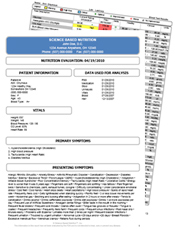Weight loss. one of the most talked about topics when it comes to women’s health. Let’s face it, in today’s media driven society, we are putting ourselves on display more than ever and are even comparing ourselves to other women our ages all the time. The weight may have creeped up over the years and now you feel stuck. Or, your typical workout routines just aren’t enough anymore. Women sometimes go to great lengths to try and discover the perfect weight loss product or program on the market. And let’s be honest, there are way too many to choose from. From fasting, to yo-yo dieting and detoxing, many of the weight loss programs out there now are too hard and too fast for the body to handle and, without proper guidance from a professional, you could end up causing more harm than good or even end up in the hospital! Crash dieting has been known to cause heart palpitations, a drop in blood pressure, and even increase your risk for heart attacks.1
The word diet should be used when describing your lifestyle habits. When people say they are “going on a diet” does this mean that they weren’t on one before? Case in point…They were on “diet” before but their diet probably consisted of pro-inflammatory foods, fast food, sugar, and dairy. Portion control can be quite time consuming and dictates unrealistic rules which set most people up for failure. In addition, when most people start counting their calories and following a low calorie diet, it slows their metabolism and in addition their protein intake drops too low which increases their susceptibility to infections, joint, bone and muscle disorders.
There are many factors that influence one’s ability to lose weight. Ask yourself, why have you gained weight? Have you ruled out factors that only a health professional can discover such as altered Thyroid function, imbalanced hormones, poor digestion, or even the medications you are on?
So where should you start?
- Get a physical. You want to be sure that before you start any exercise program, you are cleared to do so. This is especially important for those that are not currently exercising.
- Get your blood tested thoroughly. This will tell you exactly what your body is lacking or what toxicities you may have. You may have to take supplements to fix the deficiencies found. By getting your blood tested, you won’t have to guess at what supplements you may need. For specialty cases, such as autoimmune diseases, you may be referred to your endocrinologist.
- Drink 2-3 quarts of clean filtered water daily. Be sure you measure it so you know how much you are drinking. TIP: Try filling up a 32 oz water bottle in the morning and drink it by lunch time. Then fill it up again and drink another 32 oz before dinner.
- Read your labels. Try to avoid all soy, artificial sweeteners, colors, dyes, and whey. The deal with soy is that most of it is genetically modified and heavily sprayed with pesticides. Too much consumption of this can cause endocrine imbalances which affects your hormones and thyroid. Soy has the ability to actually mimic estrogen in our bodies which not only increases your chances of breast cancer, but the body encourages the body to hold onto fat. If you are drinking a protein shake as a meal replacement or after a workout, be sure you avoid the powders with soy in them. Opt for an egg white protein, rice powder, or pea powder.
- Cut down on the sugar. This includes fruit juice and soda, breads, pasta, crackers, cookies, chips, potatoes, and sweets. With carbohydrates, it is a fact that if you consume more than your body can use, your body stores them for later (which contributes to weight gain).
- Reduce dairy. Did you know that 60% of adults are unable to digest milk? This is mainly because lactase, the enzyme responsible for digestion of milk, is stopped produced when we are 2-5 years old.2 Consumption of dairy can increase gas, bloating, diarrhea, and nausea.
- Increase proteins and healthy fats in the diet. Chicken, fish, nuts, seeds, quinoa, beans, eggs, and even some red meat are all good sources of proteins. (TIP: Be sure to know what your Serum Iron and Ferritin levels are in the blood before consuming a lot of red meat. It would be contraindicated to do so if your Ferritin is high.) Healthy fats to include more of in the diet would be avocados, fish, nuts and nut butters, olive oil, and coconut oil.
- Try to eat vegetables with every meal. Fresh or frozen is best.
- Give it time. Changing up your “lifestyle habits” is not going to be easy. But remember, if you are not taking care of yourself, you may not be healthy enough one day to take care of your family. It may even take months. But if you make just 1-5% progress every month, think about where you will be at the end of the year!
These guidelines are general. Every individual is different and will need a different approach towards their goal. There is not one “cure all” factor. The most important factor to consider when considering making changes to your lifestyle is to be sure you get tested first. By doing a comprehensive blood panel and tissue mineral analysis by an experienced nutritionist, deficiencies and toxicities can be detected. This will save you time and money in the long run because you won’t be guessing at what your body needs and where you are lacking. Lose weight in a healthy way by making the necessary lifestyle changes in order to have long term success with weight loss.
References:
- http://www.cnn.com/2010/HEALTH/04/20/crash.diets.harm.health/
- Weise, Elizabeth. Sixty percent of adults can’t digest milk. USA today. 9/15/2009.

